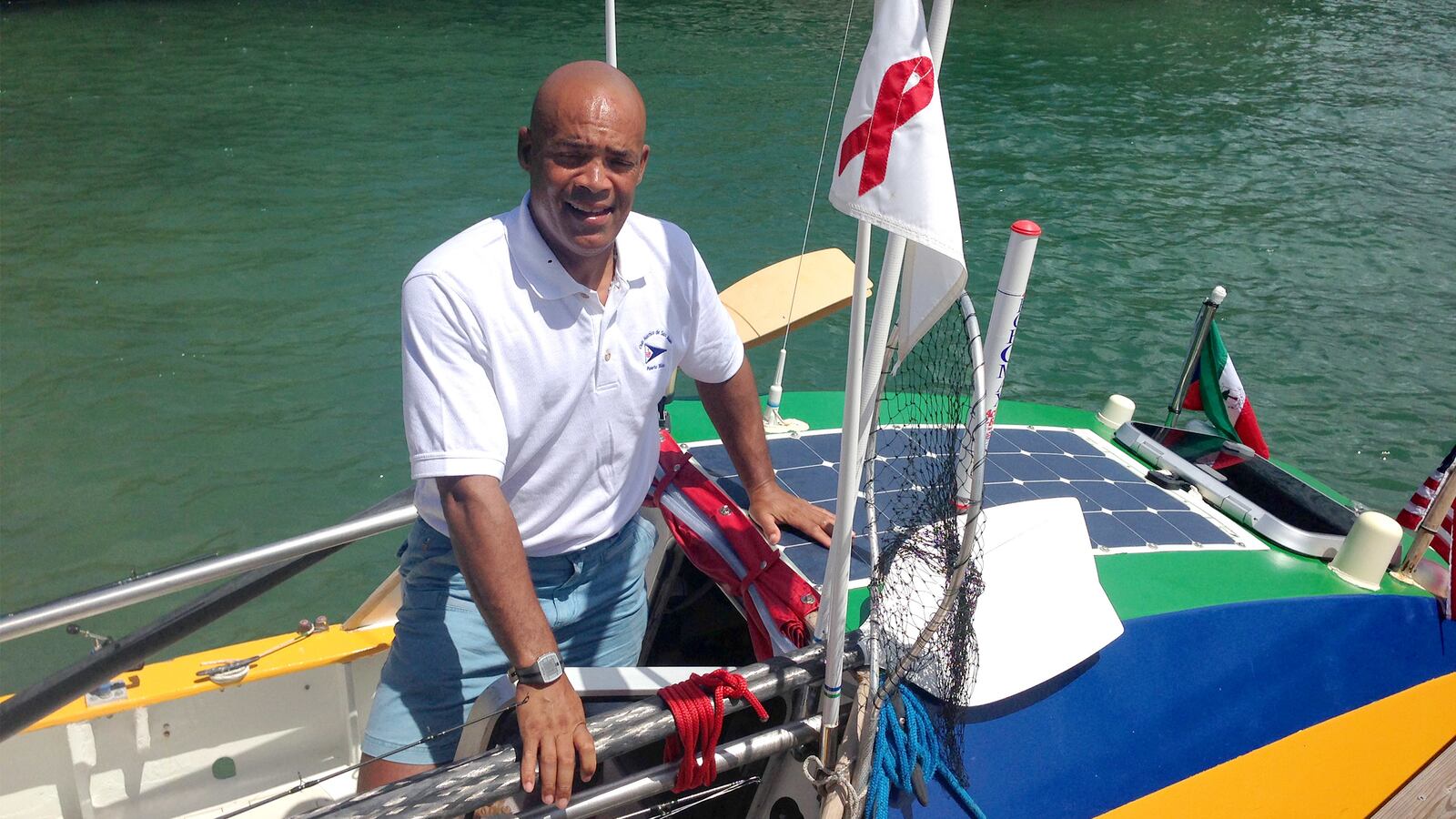The first time I spoke with 48-year-old Victor Mooney, he had just reached the Samaná Province in the Dominican Republic. The previous five days were spent isolated and alone, rowing from Anguilla by way of the Mona Passage, which separates the Dominican Republic and Puerto Rico. “Many people die in that crossing,” Mooney told The Daily Beast. “It can be very treacherous.”
Mooney is eight months into a 5,000 miles journey from Africa to his home in New York City. He’s tried the journey not once, not twice, or even three times: Mooney is over halfway through his fourth attempt and he’s promised his wife, Su-Ping, that it will be his last. His determination is strong and he has his sight set on reaching New York by the end of the year—shark attacks, hurricanes, and winter storms be damned.
The ambitious journey is Mooney’s way of raising awareness and advocating prevention for HIV and AIDS, in honor of his two brothers—one who currently lives with the virus and the other who passed away in 1983. “At that point, many people didn’t want to talk publically about HIV or AIDS,” he recalled of his brother’s passing. “His body just reached a point where it was time.”
Mooney’s journey thus far has wreaked its own kind of havoc. He lost 80 pounds during his first four months at sea. His body has endured harsh heat and constant strenuous activity. The turbulent waters caused one of his oars to crack, which—without a motor or a sail—can be severely detrimental to his voyage. They are his only means of making it back to land.
The memory of his brothers keeps him motivated; plus, a five-day trek pales in comparison to the 130 days Mooney spent making his way from an islet off the coast of Morocco to the Caribbean island of St. Maarten, where he had arrived just weeks before we spoke.
Mooney’s attempts at the transatlantic crossing date back to 2006. A lieutenant in the New York Harbor Patrol had sparked the idea. For years, Mooney rowed around Long Island promoting HIV/AIDS awareness. It was during that time the lieutenant suggested that Mooney could go faster and further if he had a bigger boat. After some online research, he became inspired by the attempts and success by others who had crossed the Atlantic Ocean and began planning his own voyage.
He set off from the coast of Senegal in a 24ft homemade rowboat. Within a matter of hours, the vessel that Mooney had crafted began to sink. The Senegalese Coast Guard came to his rescue. The attempt had failed, but his spirit was not broken.
The incident made something very clear—he couldn’t do it alone. He would need professional assistance, which came in droves. Companies across the country donated supplies and equipment to assist him with his expedition. A professional craftsman was recruited to build the rowboat.
Three years later he embarked on his second journey fortified with all the equipment he would need to survive: GPS, satellite phone, a small generator, and rations of food in case he was unable to catch fresh fish. Everything went smoothly, until the end of the second week: the on-board water filtration system failed. Mooney had to be rescued again.
An even more advanced boat was built and Mooney returned to Senegal in 2011 for his third attempt. Yet luck continued to elude him. His vessel, named “Never Give Up,” was damaged during transportation. Local mechanics pitched in to help mend the craft, but weeks into setting off the repairs wore thin and the vessel sprung a leak. Mooney quickly inflated his life raft, sent out an SOS signal and drifted for fourteen days before he was rescued.
“I cried like a baby the first two days because I didn’t want to die,” he said. His faith in a higher power helped his fear subside as he patiently waited to be rescued. “That moment helped me with this journey--between the faith and the physical preparation of training and isolation with hot yoga.”
For years, Mooney has trained with a rowing coach to enhance his physical endurance for the potentially yearlong journey. He also practices hot yoga to increase his flexibility and prepare him for the intense heat associated with regions near the equator.
Mooney is now eight months into his final attempt—a journey that has been relatively smooth sailing, aside from a cracked oar, the looming hurricane season, and a brief shark attack which happened mid-Atlantic when a hungry shark tried to snap up smaller fish feeding on the barnacles that had attached themselves to his boat. Damage was minor, Mooney evaded injury, and was able to safely make it to the Caribbean and closer to his final destination.
During each stop, Mooney takes a few days to recover from his time at sea and replenish his body. His 130-day stretch withered his body down to 140 pounds—80 pounds lighter than when he departed from Africa. He also seizes the opportunity to do public outreach, educating locals on HIV and AIDS as well as preventative methods.
“AIDS is effecting the world, so I wanted to heighten the awareness that we are all in the same boat,” Mooney said. “It’s also allowing me to share the message of HIV and AIDS prevention” with local communities which has been “well received on the islands.”
To many, HIV and AIDS may seem like a crisis of the past. While medications have improved, the use of preventative drugs like Truvada remains hotly debated. For Mooney, it is an issue that needs to remain in the public eye.
In the United States, roughly 1.1 million people are living with HIV, yet 1 in 6 are unaware that they are infected. In 2011, an estimated 32,052 people were diagnosed with AIDS. Globally, HIV affects more than 33 million people, and new cases are continuing to rise.
“With the advances in science and the development of testing and medication that’s available, people can sustain themselves,” Mooney said. “But, it first starts by getting tested and that is something I have been advocating in New York for a long time.”
“Seeing [my brother’s] progression with the disease for twenty plus years,” he said, “and my other brother passing really makes me think it could have easily happened to me.”
As I ended my call with Mooney, he was monitoring tropical storm Gonzalo as it was developing into a classified hurricane. “This is what I have been dealing with lately,” Mooney said, “tropical storms and tropical waves. They come and they go, I just have to look out for a safe window. As soon as that opens up, I plan on jumping right back in the water.” His next stop: Cuba.






